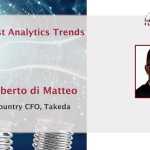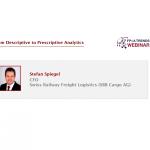In this article, we discuss how using Strategy Maps with AI-enabled analytics becomes an excellent technique...

Paying Homage to Excel
Many of today's finance and accounting leaders started their careers in the 1990s and early 2000s. At the time, these leaders were beginning to understand Excel's robust capabilities and use them within their departments. Ingenious tools and formulae like VLookUp, concatenate, pivot tables and visual charts have been game changers for finance and accounting professionals.
To this day, one thing remains constant: finance and accounting professionals love Excel. They often have many Excel sheets open and take great pride in their complex multi-tab spreadsheets. Being a department's Excel expert also comes with a badge of honour.
This love affair with Excel is one of the main reasons finance and accounting professionals struggle to move beyond Excel to embrace improved technologies. Excel is a convenient tool that has performed well for them, and professionals are used to it. We need to recognise and applaud the progress made using Excel. However, as a finance and accounting community, we need to be open to the next frontier, which will take our roles in the organisation and the value we offer to the next level.
The Case for Change: 5 Disadvantages of Using Excel
John Kennedy said, "Change is the law of life, and those who look only to the past or present miss the future."
This is very applicable as we think about moving beyond Excel. Many fantastic tools have been created that offer significant advantages to organisations above those of Excel.
Indeed, Excel has been a great tool. While there will always be room to use Excel for ad hoc analysis, we need to reduce our reliance on it as a primary planning tool.
Lack of data integrity
Spreadsheets often have errors and issues, such as circular references. It only takes one incorrect formula, link or hard-coded cell to compromise the integrity of the data.
An audit control risk
Most budgeting systems have many supporting Excel spreadsheets that are ultimately used to calculate the system's facts and figures. It can be challenging to find these supporting spreadsheets, which are often saved on a finance shared drive or, worse, on somebody's desktop.
A version control trap
Version control can be an issue as multiple people often try to update the same spreadsheet. While Excel has come a long way in this area, users are usually not up to speed on how to use this functionality effectively.
Too much complexity
This issue is often encountered when individuals leave an organisation or change roles. The individual who inherits a set of spreadsheets may not be as skilled in managing these particular Excel models or they may have an entirely different thought process.
No single source
In Excel environments, identifying and finding data can be challenging as it may be housed on shared drives or an individual computer. There is new software that provides organisations with a way to efficiently leverage historical data as a starting point for a forecast or budget.
The Benefits of Moving Beyond Excel
One of the main goals of finance and accounting professionals is to provide business insights that will improve future business results. If finance professionals spend most of their time crunching numbers and developing Excel and PowerPoint reports, they sacrifice the time they could spend analysing the business.
New software options can be programmed to complete the Excel 'busy' work and free up time for finance professionals so that they can provide value-adding insights and advice. This is a huge step forward and requires bold thinking and vision. There are significant advantages to moving beyond Excel. These include but are not limited to:
Forecast and budget efficiency
Many companies that leverage Excel as their primary budget support tool have a very linear and time-consuming budget process. They start with predicted sales volumes and go through a methodical process of calculating the associated revenue, expenses and, ultimately, EBITDA. In a rapidly changing business environment, this process often results in delivering outdated forecasts due to the time taken to complete it. Usually, as a result, stakeholders lose confidence in the forecasts. New software options significantly increase automation, speed, and flexibility when budgeting and can help build stakeholder confidence in the finance and accounting teams.
Real-time Scenario Planning
New software options allow finance and accounting professionals to use tools like Machine Learning (ML) to develop scenarios. Can you imagine going into a business meeting with three already developed scenarios that illustrate the economy's potential recovery post-COVID? This would provide tremendous value to the organisation, much more than having static and cumbersome Excel models that are simply not as flexible.
Move from number-crunching to value-added insights and analysis
Companies that have moved beyond Excel are now able to bypass a cumbersome analysis process and, therefore, focus more energy on gaining business insights. One company in the pharmaceutical industry has implemented an organisation-wide system that automates the initial financial analysis and generates a graphical representation. It is a good starting point for the finance team as they can now focus on providing insights and analysis for the future.
Improved organisational collaboration in real-time
Another massive benefit of moving beyond Excel into a live system is the potential integration of financial and supply chain data. In an Excel environment, data sharing and collaboration are often clunky, slow and do not add value. New software tools allow for a real-time exchange of information between the finance department and other functions. This can facilitate real-time operational scenarios and lead to better business decisions. For example, when a company experienced high demand during COVID, a real-time data transfer could have helped the operations team decide on the best approach for supplying customers.
In summary
In a 2017 Wall Street Journal article, Adobe's CFO Mark Garrett said he would rather have his team help him understand what the data means than spend any time importing and exporting data to and from Excel. Similarly, the CFO Journal highlighted that P.F. Chang's Jim Bell switched from Excel to cloud-based technology to foster collaboration and cut down on administrative tasks. There are many more examples of companies that have ventured beyond Excel and are reaping the rewards.
Excel has moved finance and accounting teams light years forward over the last 20-30 years. However, the current business environment requires more flexible tools. New cloud-based software helps organisations drive better business decisions and, ultimately, better results. Finance and accounting professionals should use their analytical skills in order to develop business cases that show management how an investment in finance technology can deliver a great ROI if done thoughtfully and strategically.
The benefits of moving beyond Excel include:
- Real-time data that facilitates improved decision-making.
- Improved audit control and data traceability.
- Enhanced drill-down capabilities that provide insight into the business.
- Increased collaboration across the organisation.
- Lower risks of problems when an employee leaves.
- Significantly improved business results.
This article was first published on the SAP Blog.
Subscribe to
FP&A Trends Digest

We will regularly update you on the latest trends and developments in FP&A. Take the opportunity to have articles written by finance thought leaders delivered directly to your inbox; watch compelling webinars; connect with like-minded professionals; and become a part of our global community.







